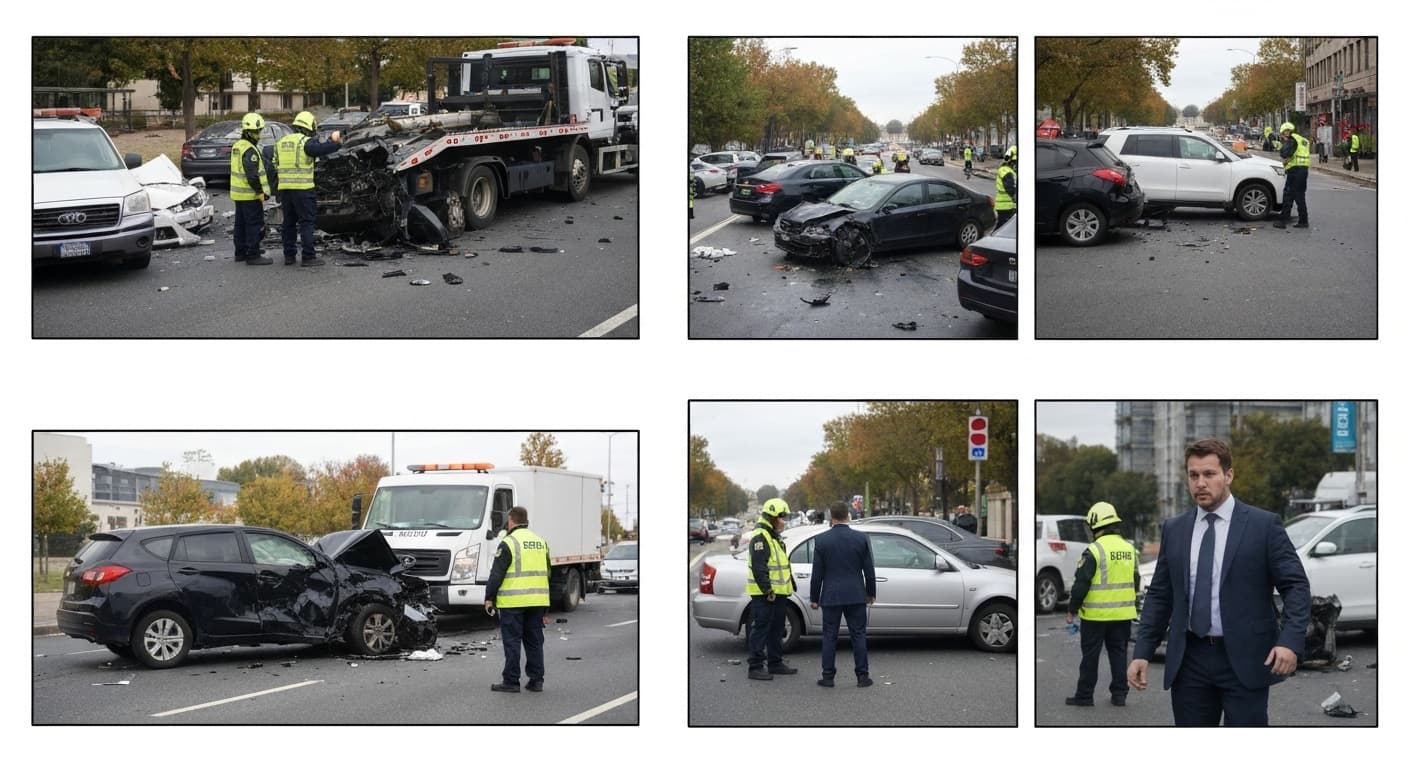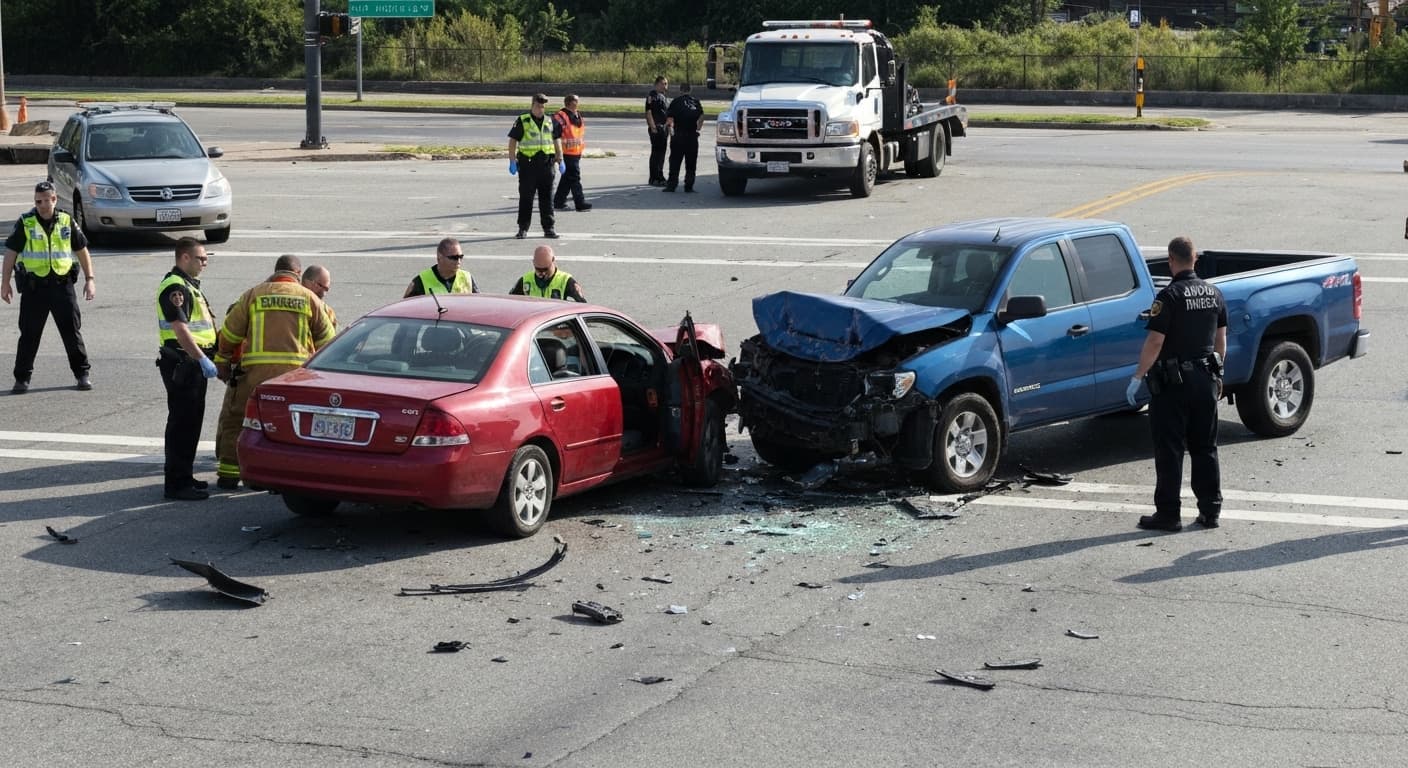
7 Essential Things to Do After a Car Collision
Learn the 7 essential steps to take after a car collision to protect your safety, preserve evidence, and strengthen your insurance claim.
# 7 Essential Things to Do After a Car Collision
Knowing what to do immediately after a car collision can protect your safety, preserve evidence, and strengthen any future insurance claim or lawsuit. Here are the seven most critical steps to take.
1. Ensure Safety and Check for Injuries
Immediate Safety Steps
Check Yourself and Passengers:
- Assess for injuries, even minor ones
- Don't move if you suspect spinal injuries
- Call 911 if anyone is hurt
- Stay calm and focused
Secure the Scene:
- Turn on hazard lights
- Move vehicles out of traffic if safe
- Set up flares or reflective triangles
- Turn off engines
- Exit vehicles carefully
When to Stay in Vehicle:
- Heavy traffic situations
- Unsafe road conditions
- Suspected serious injuries
- Vehicle cannot be moved safely
2. Call 911 and Report the Accident
When to Call Police
Always Call for:
- Any injuries, no matter how minor
- Significant property damage
- Disputed fault
- Suspected impaired drivers
- Hit-and-run situations
Information to Provide:
- Exact location of accident
- Number of vehicles involved
- Injuries reported
- Traffic hazards created
- Need for emergency services
Police Report Benefits
Official Documentation:
- Neutral third-party account
- Officer's fault determination
- Witness statements
- Traffic violation citations
- Insurance claim support
3. Document the Accident Scene
Photography Checklist
Vehicle Damage:
- All vehicles from multiple angles
- Close-ups of damage areas
- License plates
- VIN numbers if accessible
Accident Scene:
- Overall scene layout
- Traffic signs and signals
- Road conditions
- Skid marks or debris
- Weather conditions
Injuries:
- Visible injuries (if appropriate)
- Medical equipment used
- Emergency responder actions
Written Documentation
Accident Details:
- Time and date
- Weather conditions
- Traffic conditions
- Speed estimates
- Direction of travel
- What happened sequence
4. Exchange Information
Required Information
From Other Drivers:
- Full name and contact information
- Driver's license number
- Insurance company and policy number
- Vehicle make, model, year, and color
- License plate number
Your Information to Share:
- Name and contact information
- Insurance company and policy number
- Driver's license number
- Vehicle information
What NOT to Discuss
Avoid Saying:
- "I'm sorry" or admissions of fault
- Speculation about causes
- Details about insurance coverage
- Personal information beyond basics
- Opinions about who's at fault
5. Gather Witness Information
Identifying Witnesses
Look For:
- Other drivers who stopped
- Pedestrians who saw the accident
- Passengers in other vehicles
- People in nearby businesses
- Security guards or workers
Information to Collect
Witness Details:
- Full name and contact information
- What they observed
- Their location during the accident
- Willingness to provide statements
- Best times to contact them
Witness Statements
Key Questions:
- What did you see happen?
- Where were you when it occurred?
- Which direction were the vehicles traveling?
- What was the weather like?
- Did you notice any traffic violations?
6. Seek Medical Attention
Immediate Medical Care
Go to Emergency Room If:
- Any pain or discomfort
- Head injuries or dizziness
- Back or neck pain
- Numbness or tingling
- Difficulty moving
- Feeling "shaken up"
Why Immediate Care Matters
Medical Benefits:
- Early injury detection
- Proper treatment
- Prevention of complications
- Professional documentation
Legal Benefits:
- Establishes injury timeline
- Creates medical records
- Prevents insurance company arguments
- Supports compensation claims
Follow-Up Care
Continued Treatment:
- Follow all medical advice
- Attend all appointments
- Complete prescribed therapy
- Keep detailed records
7. Contact Your Insurance Company
Reporting Requirements
When to Report:
- As soon as possible after the accident
- Within 24-48 hours maximum
- Before speaking to other insurance companies
- Even if you're not at fault
Information to Provide:
- Policy number
- Accident date, time, and location
- Other driver's information
- Police report number
- Witness contact information
- Description of damages
What to Expect
Insurance Company Actions:
- Assign claim adjuster
- Schedule vehicle inspection
- Begin investigation
- Contact other parties
- Provide claim number
Protecting Your Interests
Important Guidelines:
- Stick to facts only
- Don't admit fault
- Don't speculate about causes
- Don't accept quick settlement offers
- Consider legal representation
Additional Important Steps
Preserve Evidence
Keep Everything:
- Accident scene photos
- Police report copy
- Medical records
- Repair estimates
- Correspondence with insurance
- Witness statements
Track Expenses
Document Costs:
- Medical bills and receipts
- Lost wages
- Transportation costs
- Prescription medications
- Medical equipment
Avoid Common Mistakes
Don't:
- Leave the scene without exchanging information
- Admit fault or apologize
- Sign documents without understanding them
- Give recorded statements without legal advice
- Post about the accident on social media
- Delay seeking medical attention
When to Contact an Attorney
Consider Legal Help If:
Serious Situations:
- Significant injuries
- Disputed fault
- Insurance company problems
- Multiple parties involved
- Commercial vehicles
Attorney Benefits:
- Evidence preservation
- Insurance company negotiations
- Medical treatment guidance
- Settlement maximization
- Legal protection
Timeline Considerations
Immediate Actions (First Hour)
- Ensure safety
- Call 911
- Document scene
- Exchange information
Same Day Actions
- Seek medical attention
- Contact insurance
- Notify family/employer
- Secure vehicle storage
Within 24-48 Hours
- Follow up on medical care
- Contact attorney if needed
- Begin expense tracking
- Obtain police report
Conclusion
Following these seven essential steps after a car collision can protect your safety, preserve crucial evidence, and strengthen your position for any insurance claims or legal proceedings.
Remember that your actions immediately after an accident can significantly impact your ability to recover compensation later. When in doubt, prioritize safety and seek professional help.
The most important thing is ensuring everyone's safety and getting proper medical attention. Everything else can be handled with time and professional assistance.
Remember: These steps are guidelines. Every accident is different, so use your best judgment and prioritize safety above all else.
---
Been in an accident? Contact an experienced car accident attorney today to ensure your rights are protected and you receive fair compensation.


